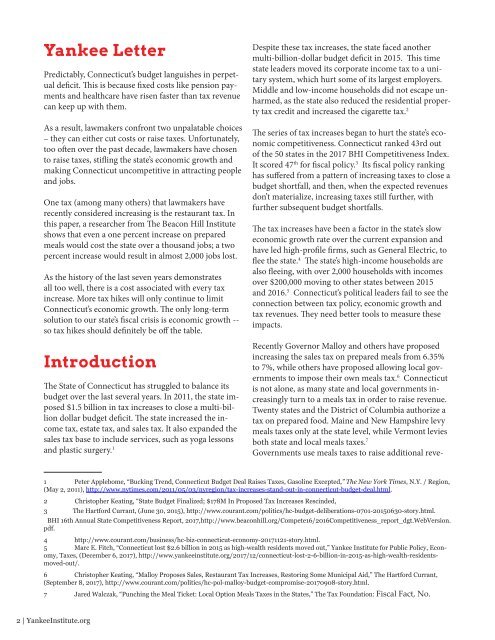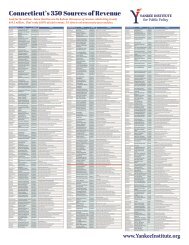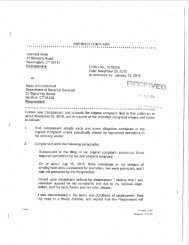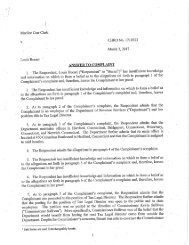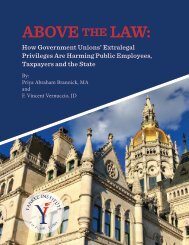Restaurant tax
You also want an ePaper? Increase the reach of your titles
YUMPU automatically turns print PDFs into web optimized ePapers that Google loves.
Yankee Letter<br />
Predictably, Connecticut’s budget languishes in perpetual<br />
deficit. This is because fixed costs like pension payments<br />
and healthcare have risen faster than <strong>tax</strong> revenue<br />
can keep up with them.<br />
As a result, lawmakers confront two unpalatable choices<br />
– they can either cut costs or raise <strong>tax</strong>es. Unfortunately,<br />
too often over the past decade, lawmakers have chosen<br />
to raise <strong>tax</strong>es, stifling the state’s economic growth and<br />
making Connecticut uncompetitive in attracting people<br />
and jobs.<br />
One <strong>tax</strong> (among many others) that lawmakers have<br />
recently considered increasing is the restaurant <strong>tax</strong>. In<br />
this paper, a researcher from The Beacon Hill Institute<br />
shows that even a one percent increase on prepared<br />
meals would cost the state over a thousand jobs; a two<br />
percent increase would result in almost 2,000 jobs lost.<br />
As the history of the last seven years demonstrates<br />
all too well, there is a cost associated with every <strong>tax</strong><br />
increase. More <strong>tax</strong> hikes will only continue to limit<br />
Connecticut’s economic growth. The only long-term<br />
solution to our state’s fiscal crisis is economic growth --<br />
so <strong>tax</strong> hikes should definitely be off the table.<br />
Introduction<br />
The State of Connecticut has struggled to balance its<br />
budget over the last several years. In 2011, the state imposed<br />
$1.5 billion in <strong>tax</strong> increases to close a multi-billion<br />
dollar budget deficit. The state increased the income<br />
<strong>tax</strong>, estate <strong>tax</strong>, and sales <strong>tax</strong>. It also expanded the<br />
sales <strong>tax</strong> base to include services, such as yoga lessons<br />
and plastic surgery. 1<br />
Despite these <strong>tax</strong> increases, the state faced another<br />
multi-billion-dollar budget deficit in 2015. This time<br />
state leaders moved its corporate income <strong>tax</strong> to a unitary<br />
system, which hurt some of its largest employers.<br />
Middle and low-income households did not escape unharmed,<br />
as the state also reduced the residential property<br />
<strong>tax</strong> credit and increased the cigarette <strong>tax</strong>. 2<br />
The series of <strong>tax</strong> increases began to hurt the state’s economic<br />
competitiveness. Connecticut ranked 43rd out<br />
of the 50 states in the 2017 BHI Competitiveness Index.<br />
It scored 47 th for fiscal policy. 3 Its fiscal policy ranking<br />
has suffered from a pattern of increasing <strong>tax</strong>es to close a<br />
budget shortfall, and then, when the expected revenues<br />
don’t materialize, increasing <strong>tax</strong>es still further, with<br />
further subsequent budget shortfalls.<br />
The <strong>tax</strong> increases have been a factor in the state’s slow<br />
economic growth rate over the current expansion and<br />
have led high-profile firms, such as General Electric, to<br />
flee the state. 4 The state’s high-income households are<br />
also fleeing, with over 2,000 households with incomes<br />
over $200,000 moving to other states between 2015<br />
and 2016. 5 Connecticut’s political leaders fail to see the<br />
connection between <strong>tax</strong> policy, economic growth and<br />
<strong>tax</strong> revenues. They need better tools to measure these<br />
impacts.<br />
Recently Governor Malloy and others have proposed<br />
increasing the sales <strong>tax</strong> on prepared meals from 6.35%<br />
to 7%, while others have proposed allowing local governments<br />
to impose their own meals <strong>tax</strong>. 6 Connecticut<br />
is not alone, as many state and local governments increasingly<br />
turn to a meals <strong>tax</strong> in order to raise revenue.<br />
Twenty states and the District of Columbia authorize a<br />
<strong>tax</strong> on prepared food. Maine and New Hampshire levy<br />
meals <strong>tax</strong>es only at the state level, while Vermont levies<br />
both state and local meals <strong>tax</strong>es. 7<br />
Governments use meals <strong>tax</strong>es to raise additional reve-<br />
1 Peter Applebome, “Bucking Trend, Connecticut Budget Deal Raises Taxes, Gasoline Excepted,” The New York Times, N.Y. / Region,<br />
(May 2, 2011), http://www.nytimes.com/2011/05/03/nyregion/<strong>tax</strong>-increases-stand-out-in-connecticut-budget-deal.html.<br />
2 Christopher Keating, “State Budget Finalized; $178M In Proposed Tax Increases Rescinded,<br />
3 The Hartford Currant, (June 30, 2015), http://www.courant.com/politics/hc-budget-deliberations-0701-20150630-story.html.<br />
BHI 16th Annual State Competitiveness Report, 2017,http://www.beaconhill.org/Compete16/2016Competitiveness_report_dgt.WebVersion.<br />
pdf.<br />
4 http://www.courant.com/business/hc-biz-connecticut-economy-20171121-story.html.<br />
5 Marc E. Fitch, “Connecticut lost $2.6 billion in 2015 as high-wealth residents moved out,” Yankee Institute for Public Policy, Economy,<br />
Taxes, (December 6, 2017), http://www.yankeeinstitute.org/2017/12/connecticut-lost-2-6-billion-in-2015-as-high-wealth-residentsmoved-out/.<br />
6 Christopher Keating, “Malloy Proposes Sales, <strong>Restaurant</strong> Tax Increases, Restoring Some Municipal Aid,” The Hartford Currant,<br />
(September 8, 2017), http://www.courant.com/politics/hc-pol-malloy-budget-compromise-20170908-story.html.<br />
7 Jared Walczak, “Punching the Meal Ticket: Local Option Meals Taxes in the States,” The Tax Foundation: Fiscal Fact, No.<br />
2 | YankeeInstitute.org


